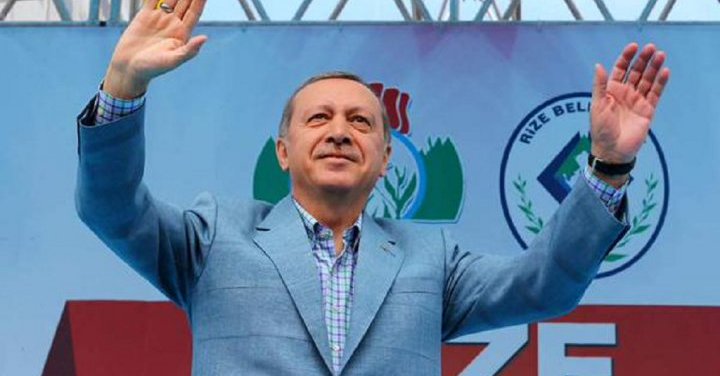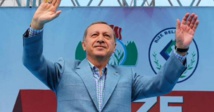"It is indisputable that Europe has to manage its borders better. We expect Turkey to do the same," EU President Donald Tusk told reporters alongside Erdogan.
But the Turkish leader insisted that his country was bearing the brunt of the problem, with around two million Syrian refugees on its territory, and pressed Brussels to do more to tackle "terrorism".
Erdogan's visit came as it emerged that 630,000 people have entered the European Union illegally this year, many via Turkey, and that Germany -- seen by most migrants as the preferred destination -- could receive up to 1.5 million asylum seekers in 2015.
Amid mounting criticism of Chancellor Angela Merkel's welcoming stance towards the refugees, thousands took to the streets of the eastern city of Dresden late Monday, accusing her of "crimes against the German people" and "treason".
"It won't stop with 1.5 or two million," said Lutz Bachmann, co-founder of the anti-Islam PEGIDA movement that organised the march.
"They will have their wives come, and one, two, three children. It is an impossible task to integrate these people," he told the protesters.
- 'Safe zone' call -
In Brussels, Erdogan, a strong opponent of Syrian President Bashar al-Assad, said the "root cause" of the refugee crisis was the "state-sponsored terrorism actually carried out by Assad himself".
"If we would like to resolve the refugee issue there are three things we have to do. One is to focus on training and equipment, the second one is to declare a safe zone that would be protected from terrorism and the third is a no-fly zone," Erdogan said.
European Commission President Jean-Claude Juncker said ahead of his meeting with Erdogan that "I will propose to my friend a common migration agenda, we will discuss this in detail."
Brussels and Ankara were reportedly discussing a European Commission plan that would see Turkey join Greek coastguard patrols in the eastern Aegean, coordinated by EU border agency Frontex.
Any migrants picked up would be taken back to Turkey where six new camps for up to two million people would be built, co-financed by the EU.
But chances of an immediate deal were slim, with the migrant crisis having further taxed relations between Erdogan and Brussels, long strained by EU criticisms over human rights and by tortuous negotiations on Turkey's application for membership of the bloc.
- Bodies washed ashore -
European officials were also set to push Turkey to tackle people smugglers, a scourge that was once again in the spotlight after the Red Crescent said the bodies of 85 migrants had been found washed ashore in Libya.
In Greece, police arrested an Afghan smuggler accused of keeping 34 migrants, including 12 minors, locked up in an Athens apartment.
The migration crisis has reached such a scale that Germany could receive up to 1.5 million asylum seekers this year, according to newspaper Bild, quoting a confidential document with estimates far higher than official figures.
Frontex chief Fabrice Leggeri said 630,000 people had entered the bloc illegally this year and called for 775 extra border guards to be deployed at the EU's external borders.
The Czech Republic meanwhile announced that it would send "about 25 soldiers" to neighbouring Hungary to help it protect the EU's external frontiers.
Most of those seeking a better life in Europe are from Syria, Afghanistan, Iraq and Africa.
The EU said last month it was setting up a 1.8-billion-euro ($2 billion) fund to help curb the inflow from African countries, which includes many economic migrants as well as those fleeing conflict and persecution.
African and EU leaders will also discuss the migration crisis at a summit in Malta next month.
French President Francois Hollande and AU chief Nkosazana Dlamini-Zuma, after holding talks in Paris on Monday, said they wanted the summit to come up with a plan to tackle the causes behind the mass movement, such as poverty, education and youth unemployment.
"We think that if we only focus on the security aspect, we won't succeed in resolving the problem," said Dlamini-Zuma. "There are no barriers that can stop people. We need to address the realities on the ground in our countries," she said.
-------------------------------------------------------------------------------------------------------------------
But the Turkish leader insisted that his country was bearing the brunt of the problem, with around two million Syrian refugees on its territory, and pressed Brussels to do more to tackle "terrorism".
Erdogan's visit came as it emerged that 630,000 people have entered the European Union illegally this year, many via Turkey, and that Germany -- seen by most migrants as the preferred destination -- could receive up to 1.5 million asylum seekers in 2015.
Amid mounting criticism of Chancellor Angela Merkel's welcoming stance towards the refugees, thousands took to the streets of the eastern city of Dresden late Monday, accusing her of "crimes against the German people" and "treason".
"It won't stop with 1.5 or two million," said Lutz Bachmann, co-founder of the anti-Islam PEGIDA movement that organised the march.
"They will have their wives come, and one, two, three children. It is an impossible task to integrate these people," he told the protesters.
- 'Safe zone' call -
In Brussels, Erdogan, a strong opponent of Syrian President Bashar al-Assad, said the "root cause" of the refugee crisis was the "state-sponsored terrorism actually carried out by Assad himself".
"If we would like to resolve the refugee issue there are three things we have to do. One is to focus on training and equipment, the second one is to declare a safe zone that would be protected from terrorism and the third is a no-fly zone," Erdogan said.
European Commission President Jean-Claude Juncker said ahead of his meeting with Erdogan that "I will propose to my friend a common migration agenda, we will discuss this in detail."
Brussels and Ankara were reportedly discussing a European Commission plan that would see Turkey join Greek coastguard patrols in the eastern Aegean, coordinated by EU border agency Frontex.
Any migrants picked up would be taken back to Turkey where six new camps for up to two million people would be built, co-financed by the EU.
But chances of an immediate deal were slim, with the migrant crisis having further taxed relations between Erdogan and Brussels, long strained by EU criticisms over human rights and by tortuous negotiations on Turkey's application for membership of the bloc.
- Bodies washed ashore -
European officials were also set to push Turkey to tackle people smugglers, a scourge that was once again in the spotlight after the Red Crescent said the bodies of 85 migrants had been found washed ashore in Libya.
In Greece, police arrested an Afghan smuggler accused of keeping 34 migrants, including 12 minors, locked up in an Athens apartment.
The migration crisis has reached such a scale that Germany could receive up to 1.5 million asylum seekers this year, according to newspaper Bild, quoting a confidential document with estimates far higher than official figures.
Frontex chief Fabrice Leggeri said 630,000 people had entered the bloc illegally this year and called for 775 extra border guards to be deployed at the EU's external borders.
The Czech Republic meanwhile announced that it would send "about 25 soldiers" to neighbouring Hungary to help it protect the EU's external frontiers.
Most of those seeking a better life in Europe are from Syria, Afghanistan, Iraq and Africa.
The EU said last month it was setting up a 1.8-billion-euro ($2 billion) fund to help curb the inflow from African countries, which includes many economic migrants as well as those fleeing conflict and persecution.
African and EU leaders will also discuss the migration crisis at a summit in Malta next month.
French President Francois Hollande and AU chief Nkosazana Dlamini-Zuma, after holding talks in Paris on Monday, said they wanted the summit to come up with a plan to tackle the causes behind the mass movement, such as poverty, education and youth unemployment.
"We think that if we only focus on the security aspect, we won't succeed in resolving the problem," said Dlamini-Zuma. "There are no barriers that can stop people. We need to address the realities on the ground in our countries," she said.
-------------------------------------------------------------------------------------------------------------------









 Home
Home Politics
Politics











